Evans Chebet Defends His Boston Marathon Title
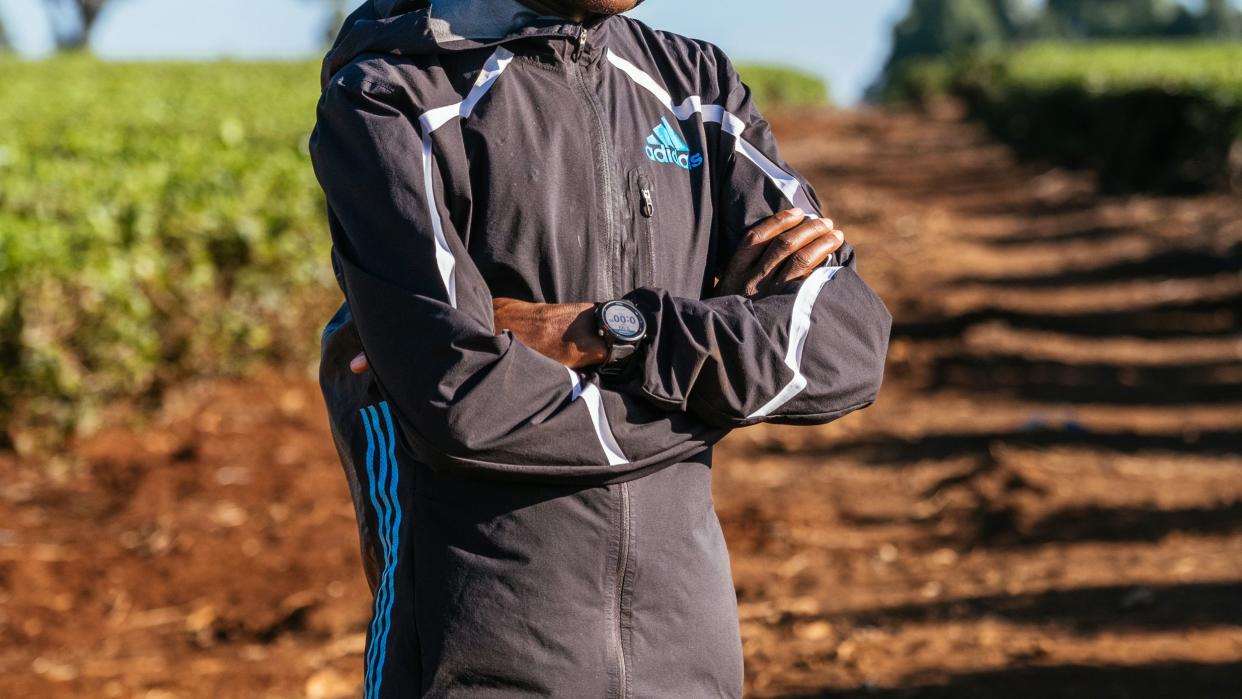
- Oops!Something went wrong.Please try again later.
- Oops!Something went wrong.Please try again later.
Before he won the Boston Marathon, before he won New York, and long before he built his mother a new home, Evans Chebet rented a small one-room house for $12 a month about 45 miles south of Kondabilet, the tiny mountain village in Kenya where he grew up. The home was sparsely furnished with a stool and an old table. Chebet cooked outdoors—usually sukuma wiki (similar to collard greens) and ugali, a traditional cornmeal porridge—and in the long hours between training sessions, he sat outside and stared at the red dirt and the evergreen forest of the Kenyan highlands, reflecting on his luck.
It was 2007. Chebet was a 19-year-old aspiring distance runner, and he’d come to seek his fortune. He was living outside Kaptagat, a town of about 2,500 people, hoping to work his way into Kenya’s talent pipeline. Many Kenyans who race internationally, including marathon world record holder Eliud Kipchoge, live in spartan high-altitude training camps in Kenya’s Great Rift Valley, sleeping in tiny unadorned rooms and sharing housekeeping chores and communal meals. Chebet was trying to gain entry to a camp run by Rosa & Associates, an Italian sports management company.
Although he grew up with few financial resources, he was now—thanks to an uncle’s largesse—rubbing shoulders with running’s greats. “I was so happy to be there,” he says.
Chebet was hardly a shining prospect. He’d never raced on the track. Indeed, he’d scarcely raced at all, and he was resigned to waiting outside the Rosa camp, and tagging along on the athletes’ brisk morning workouts. “I’d start out with the front runners, trying to show my talent,” he says. “But I’d get dropped.”
While Kenya has flourished economically over the last decade, more than 36 percent of the population lives below the poverty rate, according to World Bank data. There were—and still are—hundreds of impoverished young men and women who haunt the locked gates of Kenya’s elite training camps, harboring a ragged dream of stardom and wealth. Few succeed or even get a chance, but in 2008, a young Italian coach with Rosa named Claudio Berardelli saw something in Chebet and invited him in. “He was young and not very strong,” Berardelli says, “but I’d seen some improvement.”
That scrawny kid at the gate is now 34. He won both the Boston and New York City marathons in 2022, and he’ll face a stacked field this year when he lines up to defend his Boston title. On April 17th, in its 127th running, the Beantown classic will play host to a sort of holy visitation. The esteemed 38-year-old Kipchoge—the two-time Olympic champion, the only human ever to go sub-2:00 for the marathon—will be making his first-ever appearance at the starting line in Hopkinton. Kipchoge has been characteristically succinct about his race strategy, telling reporters, “I see myself winning.”

The man has run 27 marathons, 10 more than Kipchoge, and he’s won five of the last six he’s entered.
The field will include a total of seven sub-2:05 Kipchoge challengers. Is Chebet the quickest of all these would-be spoilers? “If you are betting on a man to mess things up for the impeccable grandmaster, it could be Evans who delivers,” says Toby Tanser, author of More Fire: How to Run the Kenyan Way. Tanser lives in Kenya and is friendly with Chebet and other top harriers.
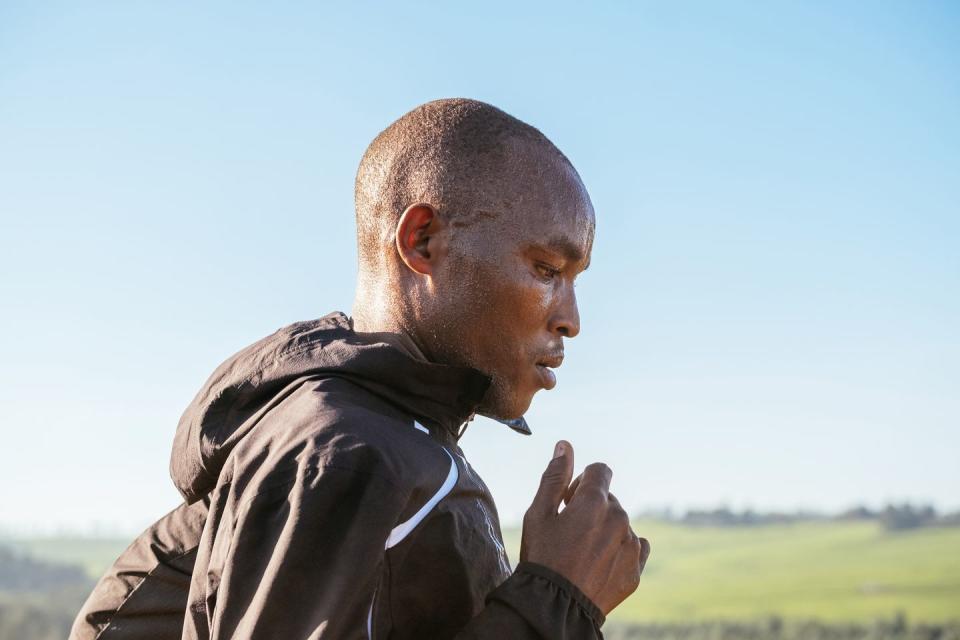
Chebet won last year’s Boston Marathon with shrewdness and authority. Early on, he tucked into the lead pack of about 15 runners. At mile 20, he climbed with this group up Heartbreak Hill. Then—still looking fresh, with just six mostly downhill miles left—he threw down the hammer and wheeled through the 22nd mile in 4:27. His next two splits were 4:26. No one could touch him. In the end, he beat runner-up Lawrence Cherono, also Kenyan, by a full half-minute, clocking a time of 2:06:51.
Seven months later, Chebet held a nagging Achilles injury at bay and hung on to win the New York City Marathon in 2:08:41 on a weirdly sweltering November day. And the victory was no fluke. The man has run 27 marathons, 10 more than Kipchoge, and he’s won five of the last six he’s entered.
Sign Up for Our Newsletter to Get More Exclusive Runner’s World Stories!
But it’s unlikely that the name Evans Chebet rings a bell with many runners. Even though Kenyans have won 23 of the 31 Boston Marathons held since 1990, most American fans don’t make the effort to distinguish one Kenyan from the next. We know Kipchoge, sure, but beyond that it’s just “the Kenyans” and facile chatter about how fleetness is “in their genes.”
And while many Kenyan winners speak English, Chebet’s facility with the language is limited. At the press conference after he won New York, he answered questions in Swahili. The marathon did not have an interpreter on hand, and when officials crowdsourced for translation, Chebet’s words were rendered so vaguely, so roughly, that the winner remained behind a sort of curtain. So when I found myself in Kenya for work last December, I saw an opportunity to unlock the enigma surrounding Chebet and humanize the man who might just topple a legend.
Eliud Kipchoge is so widely celebrated in Kenya (and the world) that he can make other runners seem invisible. Just minutes after I land in Eldoret, where many of the country’s top athletes live, I encounter a huge billboard just outside the airport with a larger-than-life picture of Kipchoge and the words “Welcome To The City of Champions.” Soon my driver, Cornelius Lagat, is telling me Kipchoge “is more protected than the president of Kenya.”
Evans Chebet is, in contrast, quite the opposite. A couple of hours after I call his publicist to ask for an interview, a guard is ushering me into Chebet’s training camp in Kapsabet, a city of more than 80,000 about an hour southwest of Eldoret, where Chebet and 19 other athletes live in small parallel bedrooms.
At 5-foot-7 and 132 pounds, Chebet is a slight man, with bright brown eyes and a shaved head. He rolls into the interview a few minutes late, wearing a yellow camo hoodie and an easy grin, even though his Achilles is still sore after New York. With his marathon winnings, he just financed, two days ago, a huge wedding to the love of his life—the mother of his three children, 26-year-old Benedicta Serem. A thousand guests had been on hand for the nuptials. Chebet’s family had helped feed the crowd by slaughtering two cows, three goats, and 10 chickens.
We sit on a couple of worn couches and then, smiling, bemused by my curiosity, Chebet spends two hours talking to me through an interpreter, his voice soft, his tone almost unrelentingly positive. “I never dreamed I’d be racing against Eliud Kipchoge in the Boston Marathon,” he says.
Chebet is the eighth of nine children. As a kid in his mountain village, he spent hours trotting along poking a stick at a worn tire beside him to make it roll smoothly over the rubbly road. The family owned one bicycle, a singlespeed black Hero Jet that for many years was too big for him; he crashed and cried as he learned to ride it. Now, he laughs at the memory. When he was about 8, he took to running a hilly loop of about nine miles whenever he felt like it. “I loved running so much,” he says.

His mother beheld Evans’s easy, flowing stride and would tell him, “Run like your father. He left the talent to you.”
Chebet’s father, Kipyesang, had been a distance runner, a 5,000- and 10,000-meter man, and had won many trophies. Only after I pressed him did Chebet note that his father died of cancer when he was a young boy. A photo of Kipyesang hung by the door of the family’s two-room house. Evans has no memory of him, but the financial struggles that followed his father’s death remain vivid. “We had enough to eat just two meals a day,” he says, “and dinner wasn’t much—just a little githeri [a mixture of corn and beans]. I always felt like I had to support my family.”
When Chebet was about 10, he began working as a day laborer, harvesting corn on nearby farms. Sometimes he burned wood, to make charcoal to sell. Sometimes, too, he herded the seven cows his family owned. Sometimes, when the cattle strayed and got lost, his older brothers, being older brothers, hit him with sticks.
He dropped out of school at 14, unable to pay the tuition, and began working full-time. He pedaled his village on the Hero Jet, gathering maize from farmers until he had enough to take three or four 90-pound sacks of grain to Eldoret. He traveled there a couple times a week in a communal van, lashing the grain to the roof and paying 80 cents for his ride.
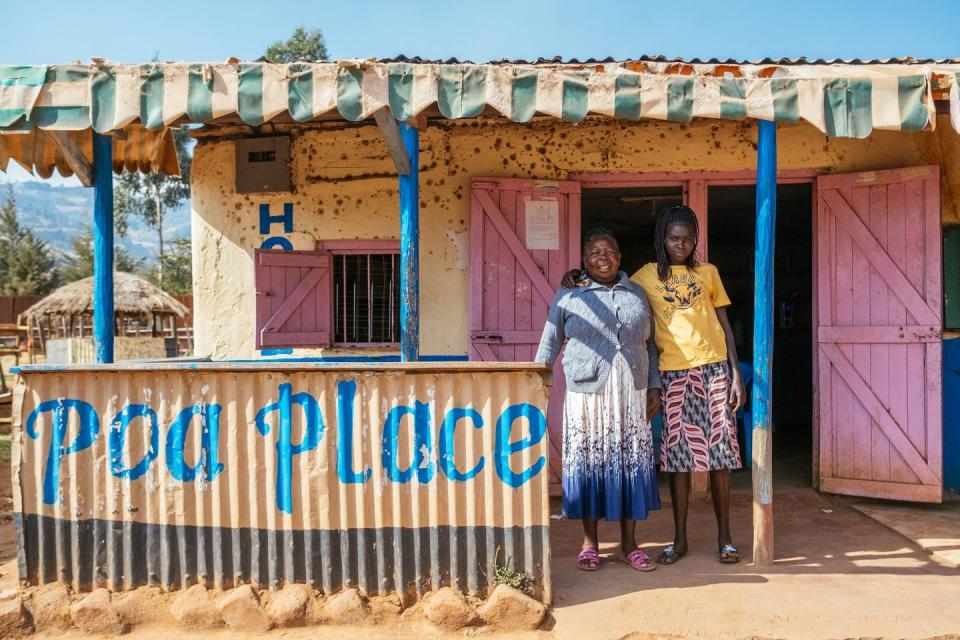
Lifting the giant sacks left his body in pain but also built his muscles. In his spare time, he kept running. A neighbor gifted him a pair of trainers, and he would work out with his older brother John. His mother, Wanjiro, beheld Evans’s easy, flowing stride and would point to Kipyesang’s photo and tell him, “Run like your father. He left the talent to you.”
In 2011, Berardelli took Chebet to his first major race, the Gargnano Ten Miler, in Italy, where he finished second in 50:53. It was a promising start, but even as Chebet spent the next few years getting faster, he never seemed able to win. In 2014, he finished second at two lucrative marathons, in Prague and in Seoul. Over the following three years, he finished second in three more marathons—in Valencia, Spain, and again in both Prague and Seoul. “He was always the number two guy,” says Berardelli. “Subconsciously, I think he’d accepted being a very good athlete rather than a real champion.”
Meanwhile, Berardelli was facing a crisis. His most prominent athlete, Rita Jeptoo, a three-time Boston Marathon winner, tested positive for EPO, a banned substance, in 2014. In 2015, after two other athletes coached by Berardelli—marathoner Mathew Kisorio and 800-meter runner Agatha Jeruto—were caught doping, he parted ways with Rosa & Associates. At the time, the company’s director, Federico Rosa, told reporters that while he didn’t believe Berardelli was involved in the cheating, he felt he “was not able to pay enough attention to his own athletes.”
The Kenyan government felt differently, though, and in 2016 charged Berardelli and two others for administering drugs to Jeptoo and conspiring to destroy her career. They were eventually acquitted, but the media coverage of Jeptoo’s fall was nonstop.
There has never been any widespread speculation about whether Chebet himself has used banned substances, nor any actions against him by an anti-doping body, but Berardelli’s travails caused a shift. In 2016, exiled from Rosa, Berardelli opened a new camp in Kapsabet where Chebet now lives.
But the relationship between athlete and coach had always been a bit strained; Berardelli spoke only limited Swahili, which made communication difficult. And there may have been a difference in perspective. “When Claudio was setting the camp up,” Chebet says, “he was a little strict, like sometimes he wouldn’t let us go home, except on the weekends. I wasn’t used to that.”
Berardelli concedes that he is demanding. “I want athletes to have the right attitude, the right behavior,” he says.
In late 2018, Chebet parted ways with his longtime mentor. Without a coach, he began crafting his own training plans and would informally head out with elite training groups. Now that he had proved himself, he received a warm welcome—and he held his position at the front.
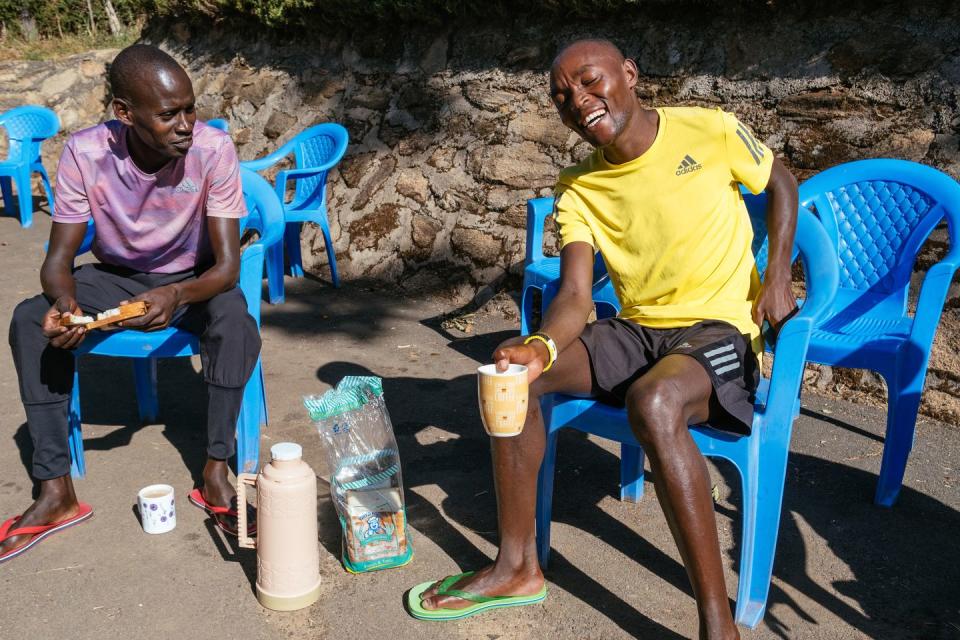
As I sat at the training camp with Chebet, observing his chill bonhomie, I knew I wasn’t seeing the whole of him. No one wins the Boston Marathon without harboring a little fire in his belly. Tanser told me, “Evans’s mental strength is upper-level. He’s a modest and reflective man, but he’s also a street fighter. He believes strongly in himself, and he truly believes he will win. You’ll never find him needing a sports psychologist.”
Where does this unbreakable spirit come from? “Whenever I’m in a big race, I remember what I went through as a kid,” Chebet says. “I had to fight to survive.” He tells me that, to understand his fortitude, I need to visit his childhood village.

“Evans’s mental strength is upper-level. He believes strongly in himself, and he truly believes he will win.”
Kondabilet sits high in the Cherangani Hills, which are regarded as a source of storms in Kenya. Its name means “eye of the thunder” in Kalenjin, a local dialect. I travel out there one morning with a tour guide, Amos Kimutai, who speculates on the Kipchoge-Chebet showdown in Boston. “Everyone is waiting for this race between Eliud and Evans,” says Kimutai, who’s run a 2:19 marathon himself. “But Boston is hard to predict. When it’s rainy and cold and windy, American runners do very well. If it’s sunny—well, the Kenyans will take it,” he says. “Evans is more tactical than Eliud. If it comes down to a sprint, Evans is going to take Kipchoge.”
Our driver, Cornelius Lagat, rejects this take, arguing that Kipchoge, who is older than Chebet, harbors superior wisdom and therefore the upper hand. “Kipchoge has the experience,” he says. “He will win.”
We turn off the highway onto a dirt road that twists steeply upward. In the center of Kondabilet, we pass Poa Place, a tiny restaurant run by Chebet’s mother, Wanjiro, age 71. Soon after that, we encounter a man driving a team of donkeys up from the Silanga river, each animal bearing two battered 20-liter plastic jugs filled with drinking water; there are still no pipes in Kondabilet.
The Chebets’ home is a mile uphill from the river. Evans is away at the camp, but Wanjiro is there to meet me. Wearing a tiered blouse and a pleated skirt in shades of pink and brown, she is accompanied by six family members. We sit in the large, airy house her son had built on his family’s land with his marathon profits. (Just in winning Boston and New York last year, he garnered $250,000 in prize money.) There is almost no furniture outside the living room, and the walls are unadorned, save for a few small holes sprouting electrical cords. (Parts of the village have electricity, but there are still no power lines where the Chebets live.)
“No mzungu has ever visited here,” Wanjiro says through an interpreter, using a Swahili word for white person, “except for missionaries and aid workers.”
Wanjiro says she’s never been interviewed by a reporter, and now what is there to say? Still, she wastes no time before launching into a proud retelling of her son’s life and achievements. Evans had his own vegetable garden when he was small. He was highly skilled at guiding oxen to plow the fields. And he always loved to run. “When Evans was young, he was running all the time—up and down through the hills,” she says. “And every time he came home, he was stretching.” She mimics Evans stretching, twisting her torso as she sits on the couch, bicycling her legs for a second. “Oh, your children!” she says, laughing with delight, “they bring you blessings!”
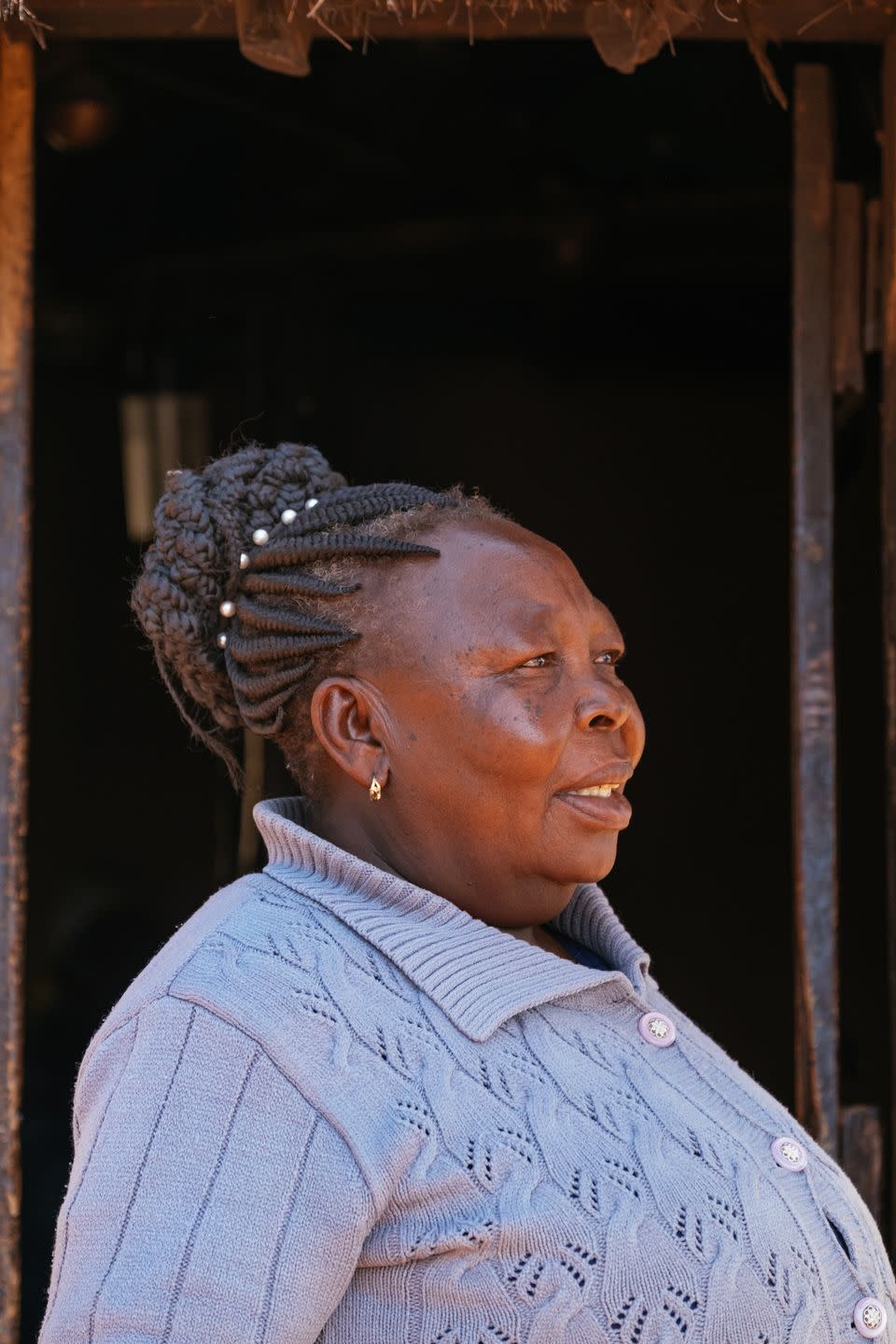
I look around the room. There is a sizable crowd watching our exchange, and they all hang reverently on the matriarch’s every word. She is the mother of nine children, and there is something solid and deeply stabilizing about her presence. I reflect now on something Evans had told me: “After my father’s death, it was my mother who felt the challenge. She struggled to provide for the entire family, but she always told us, ‘There will be better days ahead.’”
Even though her son was unproven, Wanjiro believed he could become a champion. She took Evans to the church services held each Sunday in Kondabilet’s mud-walled schoolhouse, and there he prayed that his family would be well-off like his neighbors. (“They owned a tractor,” he explained.)
Now, sitting in the living room, I feel the same force of hope at work. Wanjiro is strong. She’s kept Evans afloat, and all the while she has been buoyed by the people in that room. Evans, too, depends on them. The guy carries a fire within him, sure, but it is the love of those he knows best that sustains and propels him.
Wanjiro explains that most locals will watch the Boston Marathon via livestream on their phones. “We will be watching right in this room,” she says. “We will be praying. If Evans can beat Kipchoge, we will be very happy.”
Eventually, we wander outside into the yard, passing the two-room house Evans grew up in. Wanjiro still sleeps there—her entire wardrobe hangs from a clothesline by her bed. “It is better for old people to be in an old building,” her son William explains as we get ready to leave. “The walls hold the heat better.”
Wanjiro nods, listening, and then looks at me warmly as I climb into the car. “Next time you come,” she says, “we will slaughter a sheep for you.”

“After my father’s death, my mother struggled to provide for the entire family, but she always told us, ‘There will be better days ahead.’”
Chebet’s time away from Berardelli was defined by a certain solitude. He rented an apartment of his own. He moved about independently, training wherever he liked, and even as he battled injuries, he ran well. In 2019, uncoached, he won the Buenos Aires Marathon in 2:05:00. Still, he was accustomed to living among others—that’s how he’d always thrived. “I was used to being part of a program,” he says. “I’d had a coach since I started running, and now I was not connected.” Late in 2019, he visited Berardelli at his Kenyan home.
During the separation, Berardelli had improved his Swahili and had also done some reflecting. “I realized I needed to step back a little bit,” he says. “I needed to be a bit less demanding on some things.” Reconciliation did not take long. “In about five minutes,” the coach told me, “Evans and I decided to put the past behind us.”
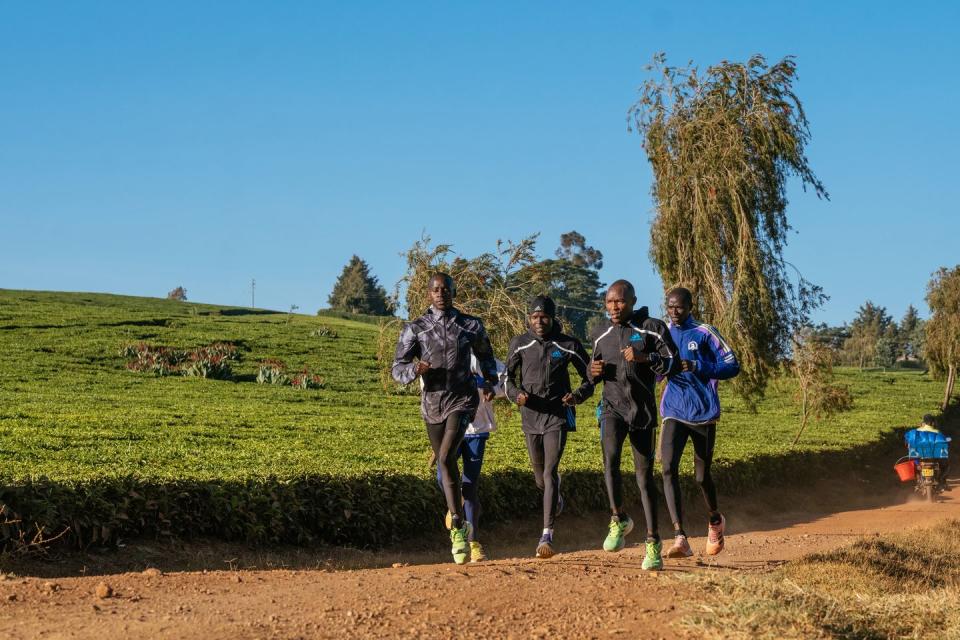
When Chebet returned to his old training group, he found a new synergy at work. Two of his longtime cohorts, Benson Kipruto and Amos Kipruto—not brothers but members of the same Nandi ethnic group—were pushing one another so much that in time they’d win major marathons in, respectively, Boston and London.
“Evans didn’t want to be left behind,” Berardelli says. “He found a new motivation.”
He also found in the Kiprutos the kind of support that sustains him, that he has always gotten from his family. “We are like brothers living in the same house,” Benson Kipruto says, speaking of Evans and Amos. “We live together, and we understand each other.”
“When we have a problem, they encourage you,” Chebet says. “We are there for each other.”
At the 2020 Valencia Marathon, with under 200 meters to go, Chebet was trailing his countryman, Lawrence Cherono, and seemed bound for yet another runner-up performance. But then suddenly he located another gear. He churned into the lead, and on the last straightaway he buried Cherono, winning by a full four seconds as he lowered his PR to 2:03:00.
When I was visiting Kenya just a month after Chebet’s victory in New York, Berardelli was worried that maybe he’d never witness such magic again, for Chebet had spent weeks away from camp, planning his wedding. The Achilles injury was scuttling his training. Berardelli wondered if his athlete was still motivated. “Financially, he’s stable,” Berardelli says. “He has what he needs. Is it over?”
When I talked with Chebet over Zoom in March, though, he said he was pain-free. With Benson Kipruto, who will also run Boston, he’d just done a workout designed to prepare them for Heartbreak Hill and what follows. They’d knocked out 10 repeats over a one-mile stretch of road that featured a hard climb flowing into a steep descent. Chebet told me that he was ready—and that he has a crucial prerace ritual that he has never once skipped.
“A week before I leave Kenya,” he explained, “I go home to Kondabilet. My family gives me their blessings. We pray. And then I meet with my mother, and always she tells me, ‘You need to go and get your best because you know where you’ve come from.’”
As we were wrapping up this conversation, I asked Chebet if he had any questions for me.
His response was almost automatic. “I want to know about your family,” he said. I began telling my story, and as I spoke, Chebet canted his head a notch closer to the camera. He listened, intent, it seemed, on locating some truth in my gestures, in the tone of my voice.
When I was done, the interpreter swiveled his laptop so that Chebet could address me directly. I watched him speak. The moment seemed peaceful and underlain by the most earnest goodwill. “He is saying,” the interpreter said, “that he is very grateful that you took the time to visit his family and to know his mother.”
Update: On April 17, 2023, Chebet successfully defended his Boston Marathon crown, finishing in 2:05:54. Eliud Kipchoge crossed the line in sixth with a time of 2:09:23.
You Might Also Like

